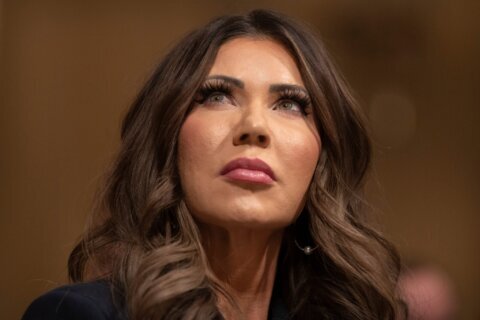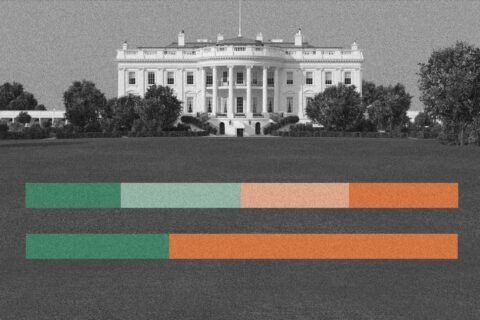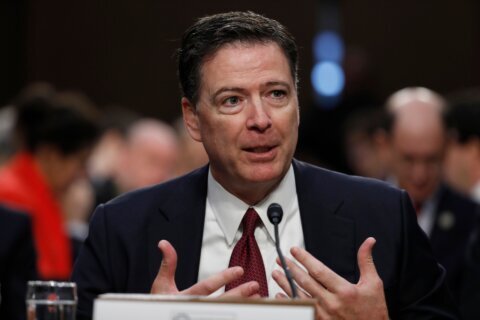NEW YORK (AP) — The unwritten rules that have so far prevented the Democratic presidential contest from devolving into all-out conflict are about to be tested.
The early front-runner, former Vice President Joe Biden, has so far fended off the relatively gentle wrath of his rivals. The shortcomings of his most ambitious opponents like Vermont Sen. Bernie Sanders and Massachusetts Sen. Elizabeth Warren have been largely overshadowed. And the fiery concerns of lesser-known candidates, such as former Maryland Rep. John Delaney and entrepreneur Andrew Yang, have been all but ignored.
That dynamic now changes as Democrats enter the most consequential week of the young 2020 campaign season.
Ahead of a major fundraising deadline, the candidates will face each other on the debate stage for the first time on Wednesday and Thursday. The clash serves as a microcosm for broader questions looming over the field, one chief among them: Should candidates attack each other more aggressively or focus their fire on President Donald Trump?
There are no easy answers for candidates desperate for a break-out moment.
In an interview, Democratic National Committee Chairman Tom Perez downplayed simmering tensions between two sharply divided wings of the party. One demands bold action on health care and climate change, while calling for Trump’s impeachment; the other favors a more pragmatic progressivism that confronts the same policy challenges with a bipartisan approach.
“What we do have is unity of values,” Perez said, noting that virtually every Democrat seeking the presidency supports universal health care coverage, combating climate change and civil rights.
Indeed, no one expects the escalation that lies ahead for Democrats to sink to the level of the Republican presidential debates in 2016, which were plagued by deeply personal attacks that have come to define the GOP’s take-no-prisoners approach in the age of Trump.
Privately, the better-known Democratic candidates concede that an overly aggressive posture could backfire at this early stage. It’s also unclear, in such a crowded contest, who would benefit should Biden or another top-tier candidate fall several months before the first primary votes are cast.
“We’re all going to focus on the issues,” Perez said when asked about the debates. “We’re not going to be talking about hand size,” a reference to GOP personal attacks from 2016.
Underlying the calculus is a real concern among party leaders, donors and strategists that Democratic infighting could threaten their chief goal: beating Trump.
But the lesser-known candidates cannot afford to be cautious. And for the first time, they will have the opportunity to voice their concerns on prime-time television facing their opponents.
“I’m offering real solutions and a lot of people in the race are offering impossible promises,” said Delaney, a pragmatic former Maryland congressman who has been actively running for president for nearly a year with little national fanfare.
Allies of more liberal and better-known candidates, including Warren, are concerned that Delaney in particular will play into Republican hands by savaging their prescription for health care — a universal health care plan referred to as Medicare for All — on national television. Delaney said he would not shy away from his criticism of the plan, particularly his contention that it would outlaw private insurance.
Another moderate Democrat, former Colorado Gov. John Hickenlooper, is expected to echo a popular Republican talking point by highlighting his Democratic competitors’ embrace of socialism. The business-minded Democrat has levied the same charge in recent weeks, but this time, he would be doing it on national television alongside Sanders, a self-described democratic socialist.
Unlike some of his competitors, Sanders has not held mock debates to prepare for the upcoming faceoff, according to senior adviser Jeff Weaver, who described such preparations as an “inefficient use of time” in such a crowded field, especially given Sanders’ experience on the debate stage in 2016. The Vermont senator has focused instead on studying written materials and preparing more succinct answers to accommodate the limited speaking time available to each candidate.
“We obviously expect there will be attacks coming our way. We will be prepared to appropriately parry,” Weaver said.
Biden, already under fire for several weeks as the undisputed front-runner, expects to face continued questions about his positions on abortion, trade and fundraising and his willingness to reach across the aisle to work with Republicans — and even segregationists — in the past. New Jersey Sen. Cory Booker, California Sen. Kamala Harris, Sanders and Warren have seized on Biden’s comments in recent days, which could be particularly relevant in the critical fight for African American voters.
“The dynamic is very simple: 19 against 1,” Biden adviser Anita Dunn said. Still, with 10 candidates on stage each night, the veteran strategist suggested the initial debates would resemble “a joint press conference with 10 people” more than a prime-time food fight.
Harris, in the middle of the pack for now, is among those expected to take a cautious approach. Her rivals see her as a threat on the debate stage given her experience as a prosecutor and more recent performance in Senate hearings, but those who know her best suggest it’s too early in the process to take unnecessary risks. She took a tougher line in South Carolina this weekend arguing that she’s best positioned to take on Trump.
“The candidates with the most to gain will throw the sharpest blows. If you’re at 1 or 2 points in the polls you’re not going to move by playing it safe,” said Brian Brokaw, a longtime Harris adviser who is not associated with the presidential campaign. “Middle-of-the-pack candidates have to figure out the best way to be noticed without being too thirsty.”
It’s a delicate balance many candidates are struggling with, especially knowing that Democratic primary voters want a nominee strong enough to take down Trump.
Virtually all the campaigns hope to have at least one key moment in the debate to break through the noise — and raise money. Most have teams prepared to blast out video highlights to supporters on social media through the weekend ahead of a key June 30 fundraising deadline. Biden is expected to announce that he raised more than $20 million for the quarter, a number that could help strengthen the air of inevitability that currently surrounds his bid.
Veteran Democratic strategist Jesse Ferguson says that breakout moments almost never come across as scripted. And very rarely do they come from attacking an opponent from the same party.
“People may obsess over which candidate attacks which candidate, but primary voters will be most compelled by the candidate who lays out a clear indictment against Trump,” Ferguson said. “It may be much less about throwing elbows on stage and much more about throwing punches toward the general election.”
Democratic donor Robert Zimmerman, a member of the Democratic National Committee, is warning candidates of a backlash if they play too rough.
“While candidates will want to look for ways to define themselves, if they do it at the expense of each other it’s at their own peril,” he said. “Democrats have to stay united to defeat Donald Trump.”
___
Associated Press writer Juana Summers in Washington contributed to this report.
Copyright © 2026 The Associated Press. All rights reserved. This material may not be published, broadcast, written or redistributed.







